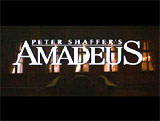
|
Amadeus
(1984)
In Oscar-winning director Milos Forman's opulent, historical
epic/costume drama based on Peter Shaffer's extravagant 1980 Broadway
play:
- the opening attempted suicide scene in which envious
Austrian court composer Antonio Salieri (Oscar-winner F. Murray
Abraham) - driven by guilt - slashed his throat with a razor, believing
that he had killed rival composer Wolfgang Amadeus Mozart (Oscar
nominee Tom Hulce)
- one of many flashbacks: the dining room sequence of
Salieri's voyeuristic watching (while hiding) of a boisterous couple:
the amorous, crude and bawdy, lecherous, hyena-laughing, giggling
childish musical prodigy - Mozart himself - and his fiancee Constanze
(Elizabeth Berridge); he saw Mozart grab Constanze and drag her under
the table with him; Mozart playfully spoke with her: "Ssik,
Kiss, Ym, my, ssa. Kiss my ass"; he seriously proposed marriage
to her ("Em-yrram!"), but when she refused, he replied
that he loved her ("Uoy-evol-I-tub"); when he then told
her to eat his shit ("Tihs-ym-tae") while kissing her bounteous
cleavage, she called him a "filthy fiend"; it was unnerving
for Salieri to hear the supposedly 'dignified' and virtuous musician
drunkenly using lewd scatological humor while chasing after Constanze;
reflecting back, Salieri expressed his disgust and disbelief: "That
was Mozart! That, that giggling, dirty-minded creature I'd just seen
crawling on the floor..."
|
Dining Room Scene: Salieri Spying on Mozart and
Constanze
|

|
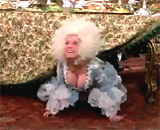
|
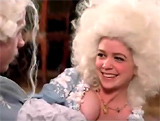
|
- in flashback, after Mozart's musical concert for
Prince-Archbishop Colloredo (Nicholas Kepros) of Salzburg in Vienna,
Salieri's blissful memory of being further awed by the childish
musical prodigy when he examined Mozart's sheet music for Serenade
for Thirteen Wind Instruments and was amazed by its genius:
("On the page, it looked nothing! The beginning, simple, almost
comic. Just a pulse. Bassoons, basset horns - like a rusty squeezebox.
And then, suddenly, high above it, an oboe. A single note, hanging
there, unwavering. Until a clarinet took it over, sweetened it
into a phrase of such delight! This was no composition by a performing
monkey! This was a music I had never heard. Filled with such longing,
such unfulfillable longing. It seemed to me that I was hearing
the voice of God")
- another flashback when Salieri jealously reacted to original samples
of profligate Mozart's work, brought to him in secret by Mozart's
Frau Constanze, so that he could be considered for a royal appointment: "These
were first and only drafts of music. But they showed no corrections
of any kind. Not one. He had simply written down music already
finished in his head! Page after page of it, as if he were just
taking dictation! And music, finished as no music
is ever finished. Displace one note and there would be diminishment.
Displace one phrase and the structure would fall. It was clear to
me that sound I had heard in the Archbishop's palace had been no
accident. Here again was the very voice of God! I was staring through
the cage of those meticulous ink-strokes at an absolute beauty"
- Mozart's sudden transformation from boor to artistic
genius at the piano (he later stated: "I am a vulgar man, but
I assure you, my music is not")
- Mozart's constant embarrassment of Salieri (i.e.,
improving a 'Welcome March' that Salieri had composed for the Emperor,
literally farting in Salieri's face to humiliate him during a masquerade
ball, promiscuously seducing Salieri's object of lust - his music
student and soprano opera singer Caterina Cavalieri (Christine Ebersole),
etc.)
- Salieri's bitter rejection of God as he growled sarcastically: "Graci,
maestro" to a crucifix -- out of jealousy at Mozart (because
God had given a "creature"
such talent and left him only as a self-proclaimed "mediocrity"),
and his plan to sabotage Mozart by discrediting him (in a conspiracy
with other courtiers to sway tone-deaf Emperor Joseph II (Jeffrey Jones),
known for his frequent utterance: "Well, there it is!")
- the character of Mozart's somber, critical father
Leopold (Roy Dotrice) - and his stranglehold on Mozart's emotions
and sanity even after his sudden death (inspiring Mozart to compose Don
Giovanni)
- Salieri's appropriation of Leopold's identity (appearing
to Mozart at his door, with a chilling black, frowning mask that
Leopold had worn during a costume party)
- Mozart's lingering death in bed of liver disease while
Salieri took down musical dictation as Mozart composed his final Requiem
Mass
|
Mozart's Death
|

|
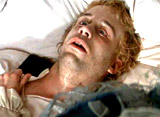
|
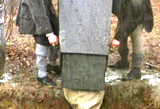
|
|
Salieri's Black Mask
|
Mozart's Death
|
Mozart's Pauper's Coffin and Gravesite
|
- Mozart's unceremonious corpse-dumping in a mass
pauper's grave
- the final, downbeat ending in which a half-insane
Salieri proclaimed himself as the King of Mediocrities and "absolved" his
fellow asylum patients as he was wheeled down an asylum's corridor
in a wheelchair: ("Mediocrities everywhere... I absolve you...
I absolve you... I absolve you... I absolve you... I absolve you
all...!")
|
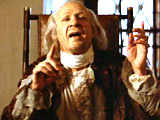
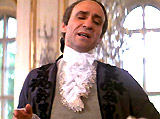
Flashback of Envious Antonio Salieri Looking at and Describing
Mozart's Sheet Music for Serenade for Thirteen Wind Instruments


Mozart Playing For Emperor Joseph II of Austria
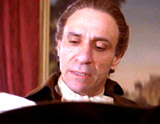

Jealous Reaction to Mozart's Original First and Only
Drafts

Salieri: "Mediocrities"
|








